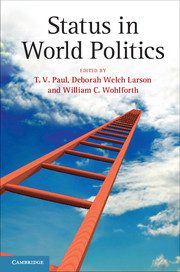Book contents
- Frontmatter
- Contents
- Figures
- Tables
- Contributors
- Acknowledgments
- Part I Introduction
- Part II Admission into the Great-Power Club
- 2 Managing Rising Powers: The Role of Status Concerns
- 3 Status Considerations in International Politics and the Rise of Regional Powers
- 4 Status Is Cultural: Durkheimian Poles and Weberian Russians Seek Great-Power Status
- Part III Status Signaling
- Part IV International Institutions and Status
- Part V Status, Authority, and Structure
- Part VI Conclusions
- Index
- References
2 - Managing Rising Powers: The Role of Status Concerns
Published online by Cambridge University Press: 05 June 2014
- Frontmatter
- Contents
- Figures
- Tables
- Contributors
- Acknowledgments
- Part I Introduction
- Part II Admission into the Great-Power Club
- 2 Managing Rising Powers: The Role of Status Concerns
- 3 Status Considerations in International Politics and the Rise of Regional Powers
- 4 Status Is Cultural: Durkheimian Poles and Weberian Russians Seek Great-Power Status
- Part III Status Signaling
- Part IV International Institutions and Status
- Part V Status, Authority, and Structure
- Part VI Conclusions
- Index
- References
Summary
The Emergence of Rising Powers
At the December 2009 Copenhagen meeting on climate change, when President Barack Obama arrived for a hastily arranged bilateral meeting with Chinese Premier Wen Jiabao, he was faced with not only Premier Wen but also the heads of the governments of Brazil, South Africa, and India. As a further snub, the president was subjected to a finger-wagging harangue by a lower-level Chinese official. At least President Obama was allowed into the room; Europeans were shut out while Obama and the emerging markets negotiated.
The Copenhagen climate change conference illustrates how the United States and Europe can no longer decide global issues alone but often need the approval of new powers such as Brazil, India, China, and Turkey: emerging powers that have distinctive national interests and may not be amenable to accepting arrangements drafted by the established powers. The diffusion of power reflects three decades of stunning economic growth in China, followed closely by India’s emergence as a major economic power and the enrichment of commodity producers such as Russia and Brazil due to the increasing demand for raw materials and energy. The redistribution of economic power was dramatized by the 2008–2009 financial crisis, when emerging markets continued to grow while the more advanced states sputtered. In order to sort out the problems created by the financial crisis, in 2008 the Group of 7 (G7) finance ministers dominated by the Western countries and Japan was replaced by the Group of 20 (G20), which includes India, China, and South Africa. In 2003, Goldman Sachs famously predicted that Brazil, Russia, India, and China (the BRIC) would surpass the share of global GDP of the Group of 6 (G6) by 2040, a prediction that now appears too conservative, as the financial institution has moved up the date for Brazil, Russia, India, and China (the BRIC) to outdo the G7 to 2032.
- Type
- Chapter
- Information
- Status in World Politics , pp. 33 - 57Publisher: Cambridge University PressPrint publication year: 2014
References
- 37
- Cited by

